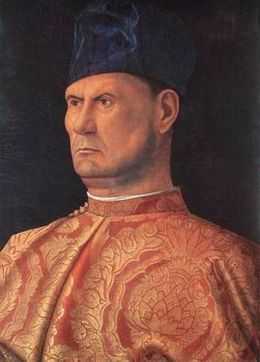Bartolomeo d'Alviano

Bartolomeo d'Alviano (1455–1515) was an Italian condottiero and captain who distinguished himself in the defence of the Venetian Republic against the Holy Roman Emperor Maximilian.
Biography
Born at Todi,[1] the son of Francesco d'Alviano and Isabella degli Atti,[2] Bartolomeo fought very early in his life in Central Italy, serving in the Papal States and, in 1496, the Orsini family against Pope Alexander VI and the Colonna.
In 1503, hired by Ferdinand II of Spain, he was determinant in the victory at the Battle of Garigliano over the French army, which started the Spanish domination over southern Italy. At the beginning of 1505 he was employed by the Venetians and was granted a cavalry captaincy by the Senate with an annual pay of 150 gold pounds.[3] In 1507, together with Nicolò Orsini, Bartolomeo was hired by the Republic of Venice. The following year he defeated the Imperial Army of Maximilian I, Holy Roman Emperor in Cadore, at Mauria and Pontebba, conquering Gorizia and Trieste. In the same year Pordenone also fell and the Serenissima assigned its signory to d'Alviano himself (the town will be ruled by d'Alviano family until 1539).
In 1509 (the year he began the construction of new city walls at Padua), however, he was crushingly defeated at the Battle of Agnadello, being also wounded in the fray. D'Alviano was charged of the result, as he allegedly attacked the enemy without the authorisation of Orsini, then commander-in-chief. Captured by the French, he remained a prisoner until 1513. In 1513, after the alliance between France and Venice against the Duchy of Milan, he was freed, and later fought under the French commander Louis de la Trémoille. He was defeated at the Battle of Vicenza by the Spanish Viceroy of Naples Ramón de Cardona.
Later d'Alviano again conquered, and sacked, Pordenone, which in the meantime had fallen again to the House of Habsburg. He was subsequently a protagonist of the French victory at Marignano (September 1515), in which he attacked the Swiss mercenaries with a corps of only 300 knights. Later he managed to conquer also Bergamo, but died in the October of the same year during the siege of Brescia.
He was buried in the church of Santo Stefano in Venice.
Notes
- ↑ Comune d'Alviano
- ↑ The family degli Atti were lords of Todi.
3. Pietro Bembo. History of Venice. Book VII,5.
In fiction
A fictional version of Bartolomeo d'Alviano appears in the video games Assassin's Creed II, Assassin's Creed: Project Legacy and Assassin's Creed: Brotherhood as a member of the Order of the Assassins.
Sources
- Rendina, Claudio (1994). I capitani di ventura. Rome: Newton & Compton.